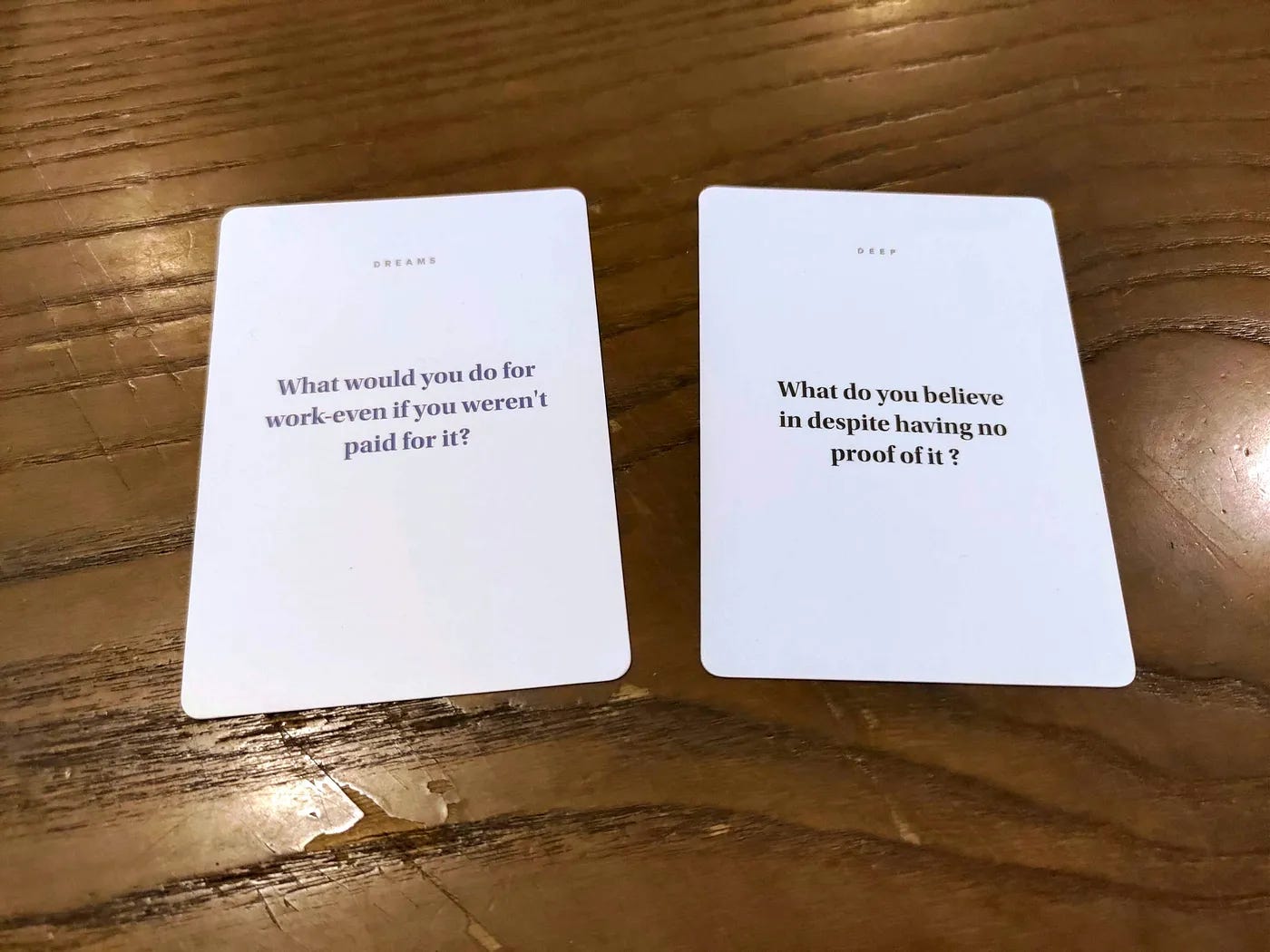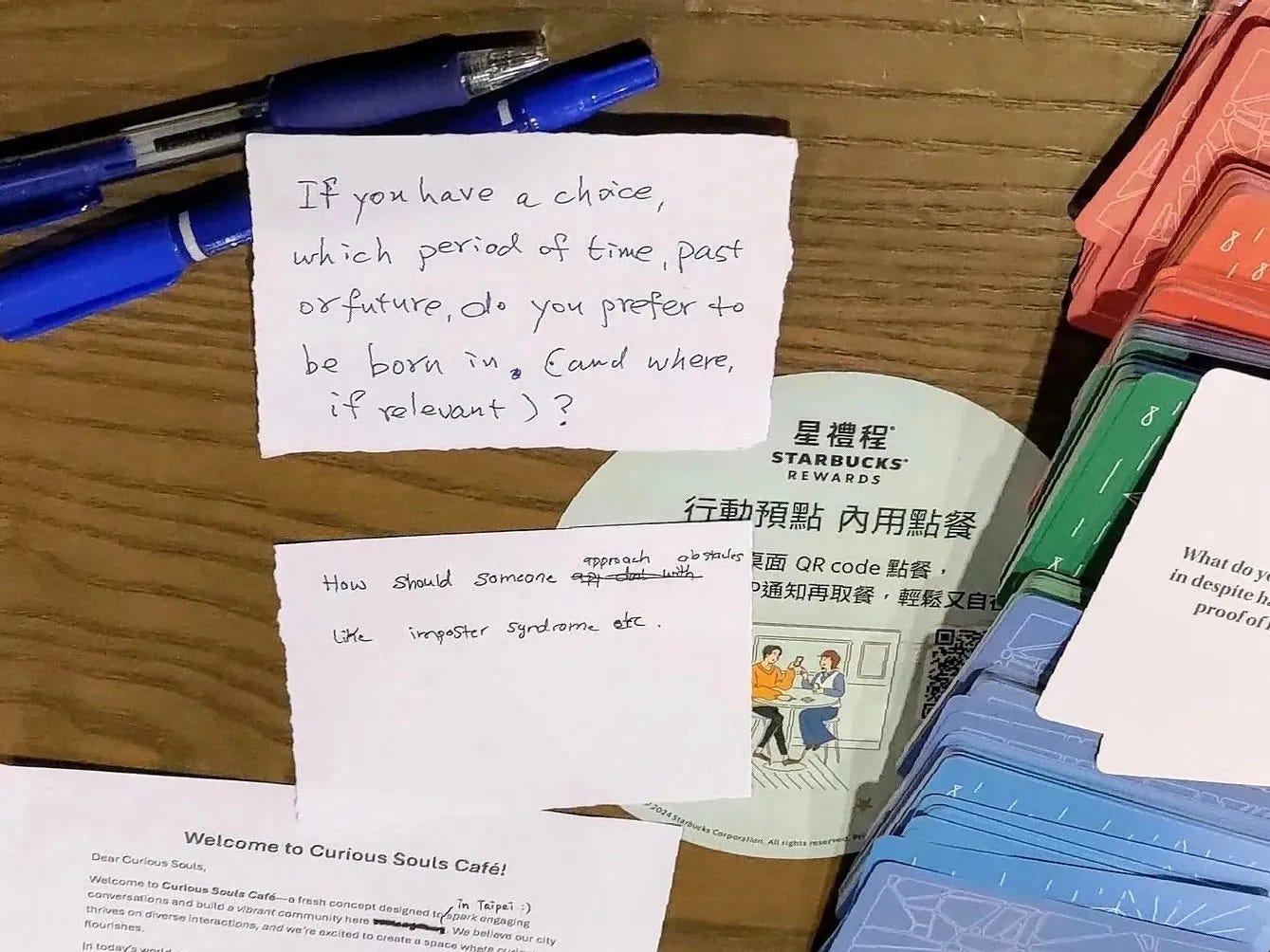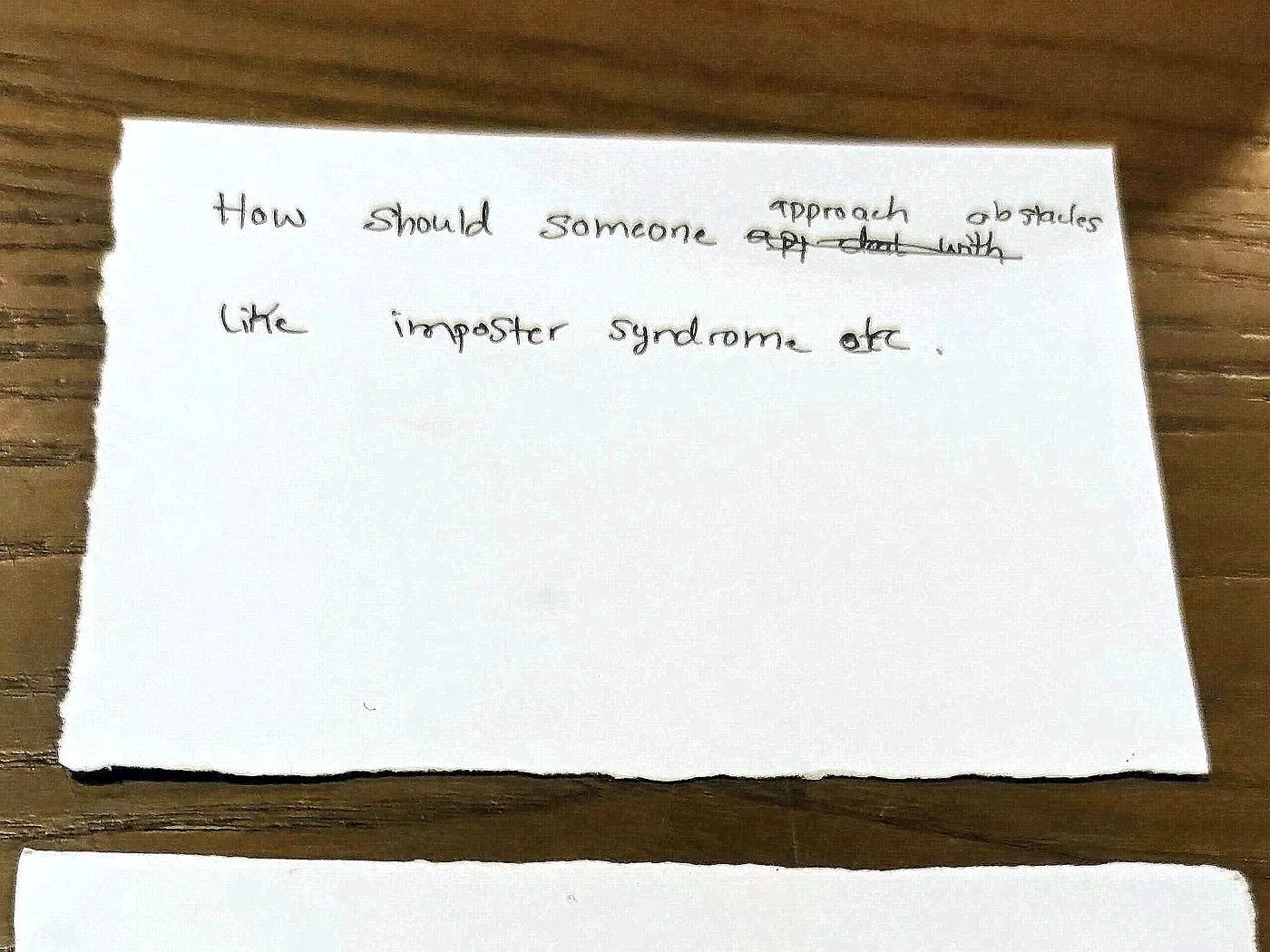From Minimalism to Imposter Syndrome and AI: Key Insights from Taipei’s First Curious Souls Café Meetup
Hello, Curious Souls! 👋 We’re excited to share the highlights of our first-ever Curious Souls Café Taipei meetup, held on December 3, 2024. This intimate gathering brought together a diverse group of individuals to explore thought-provoking topics such as faith, minimalism, imposter syndrome, and the evolving role of technology. The conversations were rich, insightful, and deeply reflective, offering a glimpse into the power of meaningful dialogue.
A Warm Welcome to Curious Souls Café Taipei
Our inaugural meetup in Taipei introduced the Curious Souls Café concept. The goal? To create a welcoming, non-academic space where people from all walks of life can engage in deep, meaningful conversations.
The group reflected our mission of diversity: a facilitator from Hong Kong, a U.S. educator working in Taipei, and a semi-retired professional from Taiwan. Guided by conversation cards, the first half of the event sparked lively discussions and unexpected connections.
What Would You Do for Work If Money Didn’t Matter?
The first conversation card, chosen by the professional, posed a compelling question:
“What would you do for work even if you weren’t paid for it?”
This question opened a fascinating dialogue about passion, purpose, and the transformative potential of AI.
The Professional: Reflecting on his past involvement with Buddhism, he shared how he once dedicated himself to helping others through faith-based activities. While his spiritual journey has evolved, he still values altruism but acknowledges the need to balance it with financial stability.
The Educator: Passionate about education, she expressed a desire to integrate AI into teaching to reduce workloads and enhance learning outcomes. For her, this work would be deeply fulfilling, even without monetary reward.
The Facilitator: With a background in IT, he humorously described himself as a “Google-fu master” who enjoys using his skills to help others. He emphasized aligning passion with purpose to create meaningful impact.
The group also debated the dual nature of AI: its potential to democratize knowledge versus its risk of exacerbating inequality if misused.
Beliefs Without Proof: Faith, Spirituality, and Personal Journeys
The next question, posed by the educator, delved into the realm of faith:
“What do you believe in despite having no proof of it?”
This sparked a profound discussion on spirituality, personal experiences, and the evolution of belief systems.
Belief in God: The educator shared her deeply personal journey with faith, describing it as an evolving relationship strengthened through life’s challenges. She likened her faith to human connections, emphasizing the importance of effort and commitment even in the face of doubt.
Evolving Perspectives on Buddhism: The professional reflected on his shift from unquestioning acceptance of Buddhist teachings (like the Six Path of Existence) to a more critical, historically informed perspective. While he no longer adheres strictly to Buddhist doctrines, he retains an appreciation for its core principles.
Solace in Nature and Taoism: The facilitator shared his respect for all religions but found personal solace in nature and Taoist philosophy, particularly the concept of “nothingness.” He highlighted the value of simplicity and interconnectedness in a chaotic world.
The Value of “Nothingness” and Minimalism
The Taoist principle of “nothingness” became a central theme, with the facilitator illustrating its significance through metaphors: a cup’s usefulness lies in its emptiness, and a wheel’s functionality depends on its hollow center. This led to a broader discussion on minimalism and its relevance in modern society.
Minimalism in a Consumer-Driven World: Participants reflected on how spiritual practices and minimalism have been commodified, often losing their deeper meaning. The educator emphasized the importance of prioritizing relationships over possessions, noting that people often regret neglecting meaningful connections in pursuit of material wealth.
The Illusion of Convenience: The group also explored how technological advancements, while designed to save time, have instead heightened productivity expectations, leaving little room for leisure or reflection.
From Obstacle to Opportunity: Tackling Imposter Syndrome
In the “Bring-Your-Own-Question” segment of the event, the educator posed a question many could relate to:
“How should someone approach obstacles like imposter syndrome?”
Drawing from her own experience transitioning from education to tech, she shared a three-part strategy for overcoming self-doubt:
Information Gathering: Transforming anxiety into a learning opportunity by acquiring knowledge and skills.
Seeking Validation: Building a supportive network to normalize feelings of self-doubt.
Seeking Advice: Leveraging mentorship to gain diverse perspectives and guidance.
The facilitator added that emotions like anxiety, when balanced with rational thinking (as in Head-Heart Thinking), can be a powerful motivator. The group also discussed the “fake it till you make it” approach, acknowledging its prevalence but emphasizing the importance of addressing underlying insecurities.
Struggles with Self-Awareness
In contrast to the educator’s proactive approach, the professional shared his struggle with self-awareness, often failing to recognize personal issues until they escalate. The facilitator offered a more optimistic perspective, suggesting that a lack of self-awareness can sometimes serve as a protective mechanism, allowing individuals to maintain a positive outlook.
A Future Shaped by AI: Hopes and Concerns
The meetup concluded with a reflective “moment of truth,” where participants shared their key takeaways. The conversation took an intriguing turn when the facilitator posed a hypothetical question:
“If you had a choice, which period of time would you choose to be born in?”
The Professional: He envisioned a future 50 years ahead, where advanced AI and technologies like 3D printing and nanomaterials revolutionize work and enable space exploration.
The Educator: She expressed concerns about AI’s impact on creativity, sharing an anecdote about an editor who found AI-generated content lacking the “soul” of human writing.
Despite these concerns, the group agreed that transferable skills like resilience, critical thinking, and adaptability will remain invaluable in an AI-driven future. Embracing AI as a tool for creativity and growth, rather than fearing it, is key to thriving in a rapidly changing world.
Final Thoughts
The first Curious Souls Café Taipei meetup was a space for self-reflection, shared experiences, and thought-provoking discussions. From navigating imposter syndrome to exploring the balance between technology and humanity, the event underscored the importance of meaningful connections and continuous learning.
We’re deeply grateful to everyone who joined us for this inaugural gathering. Here’s to many more enriching conversations in the future! 🌟








